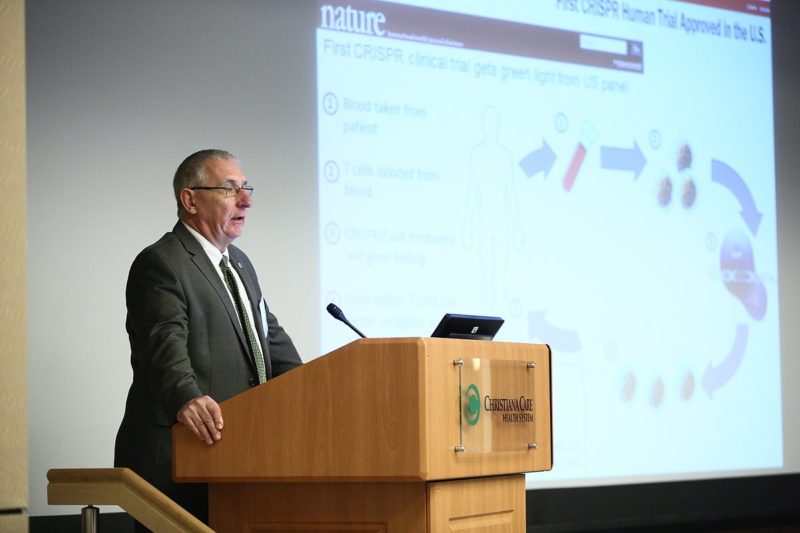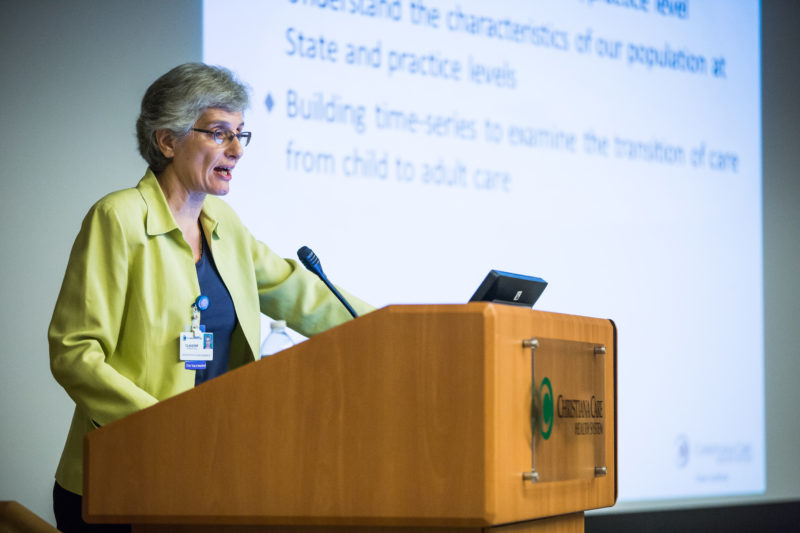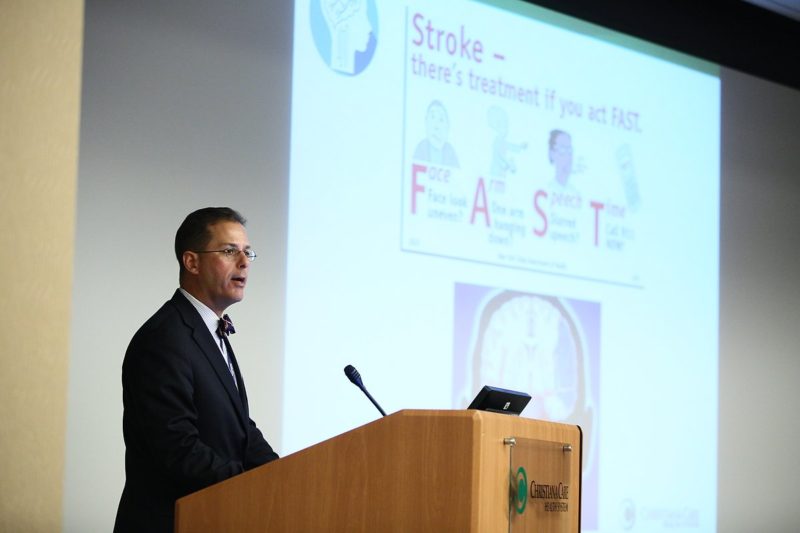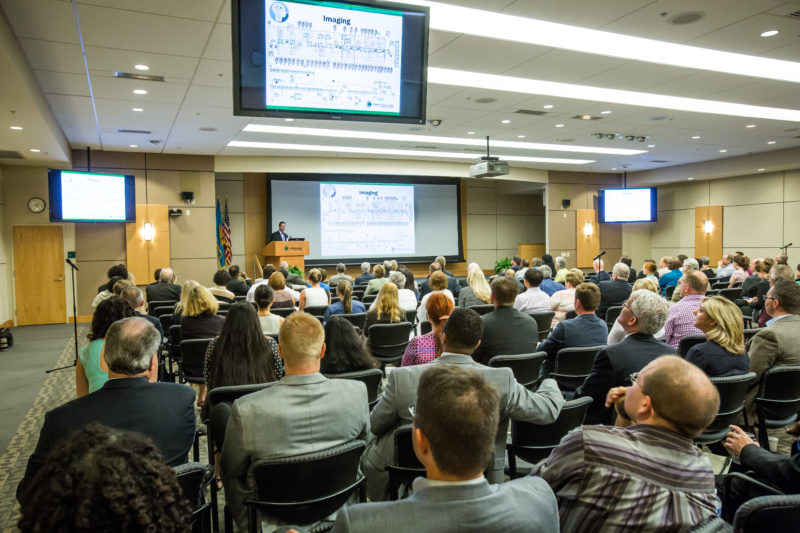The Value Institute and the Helen F. Graham Cancer Center & Research Institute co-hosted the 2016 BioBreakast, giving Christiana Care clinicians and researchers an opportunity to share medical advances with the regional biotechnology community.
“We are pleased to co-sponsor this annual BioBreakfast with the Delaware BioScience Association, an organization that is important to our Christiana Care community. We at Christiana Care Health System share a commitment to biomedical research with the organizations and members of Delaware Bio to improve the quality of medical care that we provide,” said Timothy Gardner, M.D., executive director of the Value Institute and medical director of Christiana Care’s Center for Heart & Vascular Health.
On July 12, two dozen Christiana Care staff attended the BioBreakfast with 150 participants from around the region, networking and sharing ideas at the John H. Ammon Medical Education Center.

Advances in gene editing
The morning’s first speaker was Eric Kmiec, Ph.D., director of the Gene Editing Institute at the Graham Cancer Center and a pioneer in DNA research and the cutting-edge science of gene editing. At the invitation of Nicholas Petrelli, M.D., FACS, Bank of America endowed medical director of the Graham Cancer Center, Kmiec founded the Gene Editing Institute in July 2015 and conducts translational research and technology development, and provides CRISPR/CAS9 gene editing tools.
Because of this work, the Gene Editing institute has launched partnerships that include:
- Collaboration with NovellusDX in Israel to find gene mutations amenable to customized gene editing treatments in patients.
- Assistance with research within the Wistar Institute in Philadelphia by providing gene editing tools for 70 Wistar researchers.
- Efforts to create educational resources on gene editing for everyone from high school students to post-doctoral students. New training kits and webinars are in development with Genomeweb Webinars, Bio-Rad Laboratories and the National Institute of Health’s (NIH) new training program called GEENI (Gene Editing National Initiative).
The Gene Editing Institute has a team that is looking at how to use CRISPR/CAS9 in clinical trials for patients with lung cancer in Delaware. “Gene editing is clearly going to transform medicine,” Kmiec said.

Statewide kidney disease registry
Nephrologist and epidemiologist Claudine Jurkovitz, M.D., MPH, Value Institute senior physician scientist, described her project to link Delaware electronic health records from multiple data sources and build a statewide Chronic Kidney Disease Registry, offering a unified longitudinal description of care.
The registry is a Big Data Pilot Program funded under Delaware CTR-ACCEL, a project of the National Institutes of Health to accelerate clinical and translational research and build research infrastructure. Some of the initial goals for the registry are to develop models and methods for predicting hospital admission and to access transition-of-care information for children with chronic kidney disease as they grow into adults.
The Patient-Centered Outcomes Research Institute (PCORI) also recently awarded the Eugene Washington Engagement Award to Dr. Jurkovitz. This funding will enable engagement of patients and stakeholders in developing patient-centered outcomes research studies that utilize the statewide registry, said Dr. Jurkovitz, the PCORI principal investigator.
PCORI is an independent, non-profit organization authorized by Congress in 2010 to fund comparative effectiveness research that will provide patients, their caregivers and clinicians with the evidence needed to make better-informed health and health care decisions. PCORI is committed to seeking input from a broad range of stakeholders to guide its work.

Stroke care in Delaware
The final presenter from Christiana Care was neuroradiologist Kert Anzilotti, M.D., MBA, chair of the Department of Radiology and physician leader of the Neurosciences Service Line. He talked about recent advances in the diagnosis and treatment of acute stroke in Delaware, suggesting that major advances in cranial imaging, medications and endovascular procedures and devices now mark a “golden age of ischemic stroke treatment.”
Hospitals in all three Delaware counties are collaborating to ensure stroke patients receive timely care.
Strokes are the fifth-leading cause of death in the United States and the leading cause of serious long-term disability, according to the U.S. Centers for Disease Control & Prevention. Patients identified and treated intravenously with tissue plasminogen activator (IV tPA) within four hours of the start of a stroke, however, have excellent chances of full recovery, Dr. Anzilotti said.

IV tPA treatment can dissolve the clot that causes the stroke and improve blood flow to the affected area of the brain. Dr. Anzilotti stressed, however, the importance of quickly identifying the signs and symptoms of stroke, given that every minute after the onset of the stroke increases the possibility of permanent disability or death.
Christina Care has applied improvement science to the diagnosis and treatment of patients who have strokes. The stroke team has implemented standardized evidence-based protocols to optimize the care of acute stroke victims. As a result of these best practices, Christiana Care earned the Gold-Plus Quality Award from the American Heart Association and the American Stroke Association for maintaining high standards in the treatment of patients with stroke.
“This makes our hospital system one of the premier institutions for stroke care in the United States,” said Dr. Anzilotti.



